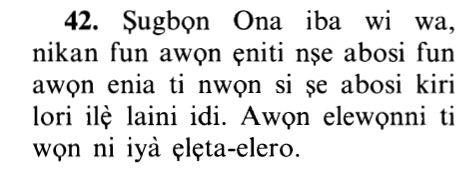42vs42
Select any filter and click on Go! to see results
إِنَّمَا السَّبِيلُ عَلَى الَّذِينَ يَظْلِمُونَ النَّاسَ وَيَبْغُونَ فِي الْأَرْضِ بِغَيْرِ الْحَقِّ أُوْلَئِكَ لَهُم عَذَابٌ أَلِيمٌ
Innama alssabeelu AAala allatheena yathlimoona alnnasa wayabghoona fee alardi bighayri alhaqqi olaika lahum AAathabun aleemun
Index Terms
Click to play
Yoruba Translation

Hausa Translation
lnda hanyar zargi kawai take, shĩ ne a kan waɗanda ke zãluntar mutãne kuma sunã ƙħtare haddin shari´a cikin ƙasa bã tare da haƙƙi ba. Waɗannan sunã da azãba Mai raɗaɗi.
Asbabu n-Nuzuul (Occasions of Revelation)
إِنَّمَا السَّبِيلُ ...
The way,
means, the burden of sin,
... عَلَى الَّذِينَ يَظْلِمُونَ النَّاسَ وَيَبْغُونَ فِي الْأَرْضِ بِغَيْرِ الْحَقِّ ...
is only against those who oppress men and rebel in the earth without justification;
means, those who initiate wrongful actions against others, as it is said in the Sahih Hadith:
الْمُسْتَبَّانِ مَا قَالَا فَعَلَى الْبَادِىءِ، مَا لَمْ يَعْتَدِ الْمَظْلُوم
When two persons indulge in abusing each other, the one who initiated the wrongful action is to blame, unless the one who was wronged oversteps the mark in retaliation.
... أُوْلَئِكَ لَهُم عَذَابٌ أَلِيمٌ ﴿٤٢﴾
for such there will be a painful torment.
means, intense and agonizing.
It was reported that Muhammad bin Wasi said, "I came to Makkah and there was a security out post over the trench whose guards took me to Marwan bin Al-Muhallab, who was the governor of Basrah. He said,
`What do you need?, O Abu Abdullah,'
I said, `If you can do it, I need you to be like the brother of Banu `Adiy.'
He said, `Who is the brother of Banu `Adiy?'
He said, Al-Ala' bin Ziyad; he once appointed a friend of his to a position of authority, and he wrote to him: If you can, only go to sleep after you make sure that there is nothing on your back (i.e., you do not owe anything to anyone), your stomach is empty and your hands are untainted by the blood or wealth of the Muslims. If you do that, then there will be no way (of blame) against you --
إِنَّمَا السَّبِيلُ عَلَى الَّذِينَ يَظْلِمُونَ النَّاسَ وَيَبْغُونَ فِي الْأَرْضِ بِغَيْرِ الْحَقِّ أُوْلَئِكَ لَهُم عَذَابٌ أَلِيمٌ
The way is only against those who oppress men and rebel in the earth without justification; for such there will be a painful torment.'
Marwan said, `He spoke the truth, by Allah, and gave sincere advice.' Then he said, `What do you need, O Abu `Abdullah?'
I said, `I need you to let me join my family.'
He said, `Yes (I will do that).'''
This was recorded by Ibn Abi Hatim.
قوله عز وجل " إنما السبيل " أي إنما الحرج والعنت" على الذين يظلمون الناس ويبغون في الأرض بغير الحق " أي يبدءون الناس بالظلم كما جاء في الحديث الصحيح " المستبان ما قالا فعلى البادئ ما لم يعتد المظلوم " " أولئك لهم عذاب أليم " أي شديد موجع . قال أبو بكر بن أبي شيبة حدثنا الحسن بن موسى حدثنا سعيد بن زيد أخو حماد بن زيد حدثنا عثمان الشحام حدثنا محمد بن واسع قال قدمت مكة فإذا على الخندق قنطرة فأخذت فانطلق بي إلى مروان بن المهلب وهو أمير على البصرة فقال ما حاجتك يا أبا عبد الله ؟ قلت حاجتي إن استطعت أن تكون كما كان أخو بني عدي قال ومن أخو بني عدي ؟ قال العلاء بن زياد استعمل صديقا له مرة على عمل فكتب إليه أما بعد فإن استطعت أن لا تبيت إلا وظهرك خفيف وبطنك خميص وكفك نقية من دماء المسلمين وأموالهم فإنك إذا فعلت ذلك لم يكن عليك سبيل " إنما السبيل على الذين يظلمون الناس ويبغون في الأرض بغير الحق أولئك لهم عذاب أليم " فقال مروان صدق والله ونصح ثم قال ما حاجتك يا أبا عبد الله ؟ قلت حاجتي أن تلحقني بأهلي قال نعم رواه ابن أبي حاتم .
"إنما السبيل على الذين يظلمون الناس ويبغون" يعملون "في الأرض بغير الحق" بالمعاصي "أولئك لهم عذاب أليم" مؤلم
أي بعدوانهم عليهم ; في قول أكثر العلماء . وقال ابن جريج : أي يظلمونهم بالشرك المخالف لدينهم .
I'raab - grammatical analysis of the Qur'an
«إِنَّمَا» كافة ومكفوفة «السَّبِيلُ» مبتدأ «عَلَى الَّذِينَ» الجار والمجرور خبره «يَظْلِمُونَ» مضارع مرفوع والواو فاعله والجملة صلة «النَّاسَ» مفعول به «وَيَبْغُونَ» الواو حرف عطف ومضارع مرفوع والواو فاعله «فِي الْأَرْضِ» متعلقان بالفعل «بِغَيْرِ» متعلقان بمحذوف حال «الْحَقِّ» مضاف إليه والجملة معطوفة على ما قبلها «أُولئِكَ» مبتدأ «لَهُمْ» جار ومجرور خبر مقدم «عَذابٌ» مبتدأ مؤخر «أَلِيمٌ» صفة عذاب والجملة الاسمية خبر أولئك وجملة أولئك مستأنفة لا محل لها
